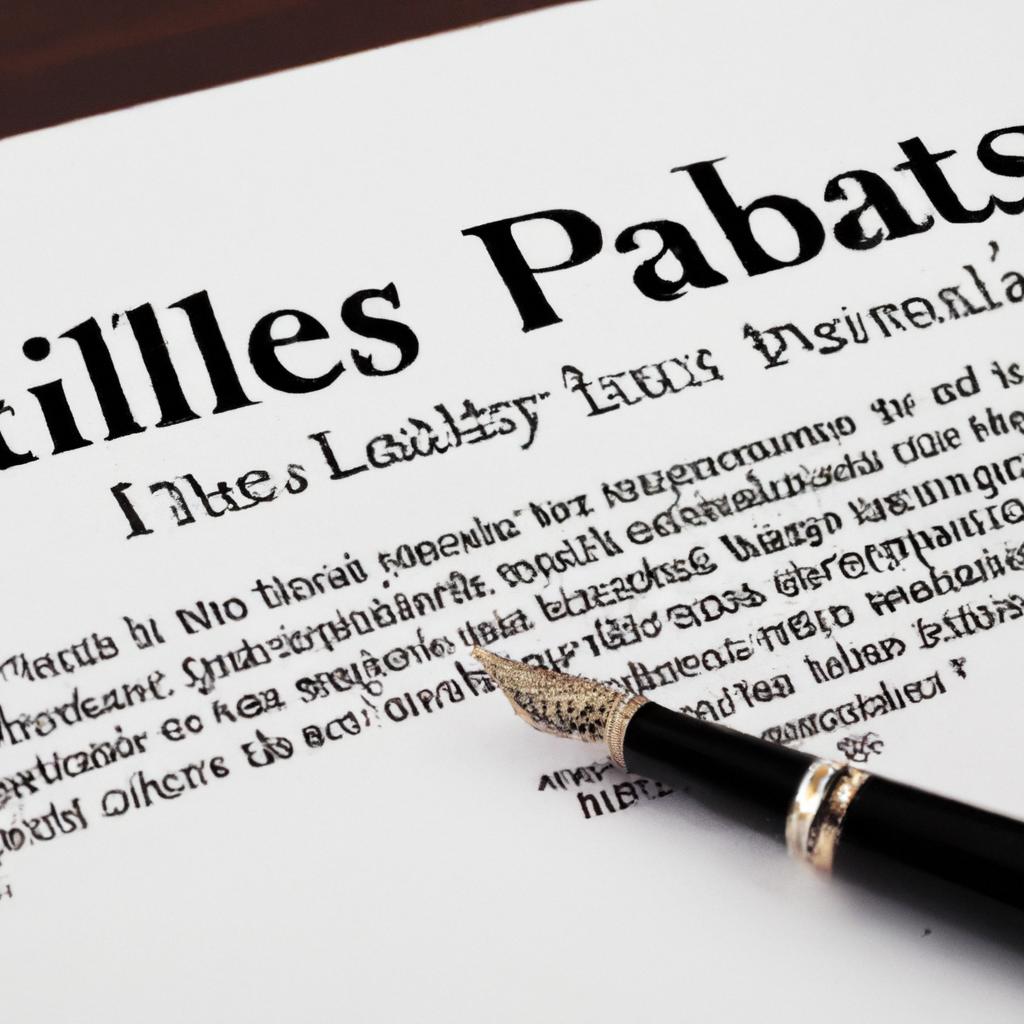Navigating the labyrinth of legal proceedings following the passing of a loved one can be overwhelming, particularly when determining the fate of their estate. One common question that individuals often find themselves pondering is: Do wills go through probate? In the realm of estate planning, understanding the probate process is essential for ensuring a smooth transition of assets to beneficiaries. As seasoned legal practitioners at Morgan Legal Group, based in the bustling metropolis of New York City, we specialize in all aspects of estate planning, including probate, elder law, wills, and trusts. Join us as we dissect the intricacies of probate and shed light on the role of wills in this complex legal system.
Understanding the Probate Process for Wills
Probate is the legal process of administering a deceased person’s estate which involves validating their will, paying off debts, and distributing assets to beneficiaries. Wills typically go through probate unless specific circumstances exempt them from the process. Here are some key points to understand about the probate process for wills:
- Validation: The court will need to authenticate the will and ensure it meets legal requirements.
- Executor Appointment: The court will appoint an executor to oversee the distribution of assets according to the will.
- Creditor Notification: Creditors must be notified and given the opportunity to make claims against the estate.

Key Factors that Determine if a Will Goes Through Probate
There are several . Understanding these factors is crucial in order to navigate the probate process efficiently. Here are some important considerations:
- State Laws: Each state has its own laws regarding probate, so the rules can vary depending on where the deceased person lived.
- Validity of the Will: A will must meet certain requirements to be considered valid, such as being signed by the deceased person and witnessed by others.
- Asset Ownership: Whether assets are held solely in the deceased person’s name or have designated beneficiaries can impact whether probate is necessary.
| Factor | Determination |
|---|---|
| Asset Ownership | Assets held in joint tenancy or with designated beneficiaries may avoid probate. |
| Debts | Outstanding debts must be addressed during the probate process. |

Strategies to Minimize Probate for Your Will
When considering the question, “do wills go through probate,” it is important to understand that probate is the legal process of administering the estate of a deceased person. While many wills do go through probate, there are strategies that can be put in place to minimize the impact and duration of probate proceedings.
One effective strategy is to establish a revocable living trust, which allows assets to be transferred outside of probate, thereby avoiding the lengthy court process. Additionally, designating beneficiaries on retirement accounts, life insurance policies, and other assets can also bypass probate. By taking proactive steps such as these, individuals can ensure that their assets are distributed efficiently and according to their wishes.

Consulting a Trusts and Estates Attorney for Proper Guidance
If you are wondering whether wills go through probate, the answer is, yes, they typically do. When a person passes away and leaves behind a will, the document usually needs to go through the probate process to ensure that the deceased’s wishes are carried out properly. During probate, the court will oversee the distribution of assets and payment of debts according to the terms of the will.
Consulting a trusts and estates attorney can provide you with the proper guidance you need when dealing with probate. An experienced attorney can assist you in navigating the complex legal process, making sure that everything is handled in accordance with the law and the deceased’s wishes. By seeking the advice of a professional, you can ensure that the probate process goes smoothly and that the final distribution of assets is done correctly.
Q&A
Q: Do wills go through probate?
A: Yes, wills typically go through probate after the death of the testator.
Q: What is probate?
A: Probate is the legal process in which a court validates a will and oversees the distribution of assets to beneficiaries.
Q: Why do wills go through probate?
A: Wills go through probate to ensure that the deceased’s assets are distributed according to their wishes and to resolve any disputes or claims against the estate.
Q: How long does probate take?
A: The length of the probate process can vary depending on the complexity of the estate and any potential disputes, but it typically takes several months to a year to complete.
Q: Can a will avoid probate?
A: In some cases, a will can be structured to bypass probate through strategies such as setting up a living trust or designating beneficiaries on certain assets.
Q: What happens if there is no will?
A: If there is no will, the estate will go through probate under intestacy laws, which determine how assets are distributed based on state law.
In Summary
In conclusion, it is important to understand that the process of probate can be complex but necessary in ensuring the wishes of the deceased are properly carried out. While not all wills go through probate, it is essential to consult with a legal professional to determine the best course of action for your individual circumstances. By taking the time to plan ahead and follow the proper procedures, you can help ensure that your loved ones are taken care of according to your wishes. Thank you for reading.
 A will, also known as a last will and testament, is a legal document that outlines how a person’s assets and possessions should be distributed after their death. It is created during a person’s lifetime and goes into effect upon their passing. Generally, the individual creating the will, known as the testator, designates a person or a group of people to manage and handle their estate, known as the executor, and names beneficiaries who will receive their assets.
A will, also known as a last will and testament, is a legal document that outlines how a person’s assets and possessions should be distributed after their death. It is created during a person’s lifetime and goes into effect upon their passing. Generally, the individual creating the will, known as the testator, designates a person or a group of people to manage and handle their estate, known as the executor, and names beneficiaries who will receive their assets.
But there is a step that comes between the creation of a will and the distribution of assets to beneficiaries – probate. Probate is the legal process of administering and settling a deceased person’s estate, including the validation and distribution of their will. In this article, we will explore the question, do wills go through probate, and provide valuable information about the probate process.
Understanding the Probate Process
When a person passes away, their will needs to go through the probate process to ensure that it is valid and legally binding. This process involves several steps, including:
1. Filing the will with the court: The first step in the probate process is to file the will with the appropriate court. This typically needs to be done within a specific timeframe after the testator’s passing, usually within a few days.
2. Validating the will: The court will review the will to ensure that it meets all the legal requirements and is valid. This includes verifying the testator’s signature, witnesses’ signatures, and that the testator had the mental capacity to create the will.
3. Appointing an executor: If the will is deemed valid, the court will appoint an executor, as named in the will, to oversee the probate process. If there is no designated executor, or if the executor is unable or unwilling to serve, the court will appoint one.
4. Notifying beneficiaries: The executor is responsible for notifying all beneficiaries named in the will and any potential heirs of the testator’s passing and the probate process.
5. Taking inventory of assets: The executor must take an inventory of all the testator’s assets, including real estate property, bank accounts, investments, and personal belongings. This inventory is called an estate appraisal.
6. Paying debts and taxes: Before any assets can be distributed to beneficiaries, the executor must pay any outstanding debts and taxes owed by the estate. This includes funeral expenses, credit card debts, and any other outstanding bills.
7. Distributing assets: Once all debts and taxes have been paid and approved by the court, the executor can distribute the remaining assets according to the instructions set forth in the will.
8. Closing the estate: Finally, the executor must present a final account of all actions and transactions to the court and seek approval for closing the estate. This usually marks the end of the probate process.
Do Wills Always Have to Go Through Probate?
Not all wills have to go through the probate process. Some assets, such as those held jointly with rights of survivorship or those with designated beneficiaries, do not have to go through probate and can be transferred directly to the designated beneficiary.
Additionally, some states have simplified probate processes for small estates, typically with assets under a certain value, which do not require the full probate process. It is essential to consult with an estate planning attorney in your state to understand the specific probate laws and processes that apply to your situation.
Benefits and Practical Tips for Avoiding Probate
The probate process can be lengthy and expensive, with court fees, legal fees, and the potential for disputes among family members. As such, many people aim to avoid probate to simplify and streamline the estate settlement process for their loved ones. Here are some practical tips for avoiding probate:
1. Add joint ownership: If you own assets jointly with someone else, such as a spouse or family member, those assets typically pass directly to the other owner upon your passing, without going through probate.
2. Designate beneficiaries: Assets with designated beneficiaries, such as life insurance policies, retirement accounts, and payable-on-death bank accounts, can pass directly to the designated beneficiary without going through probate.
3. Set up a trust: A trust is a legal entity that can hold and manage assets on behalf of designated beneficiaries. Placing assets into a trust allows them to pass directly to the designated beneficiaries without going through probate.
4. Make gifts: You can gift assets to your beneficiaries during your lifetime, reducing the size of your estate and avoiding probate.
In conclusion, the answer to the question, do wills go through probate, is yes. The probate process is a necessary and vital step in ensuring that a person’s assets are distributed according to their wishes after their passing. However, there are ways to avoid probate, and consulting with an experienced estate planning attorney can help you determine the best approach for your situation. Remember, estate planning is not only essential for mitigating potential conflicts and ensuring the proper distribution of assets but also for providing peace of mind for you and your loved ones.





